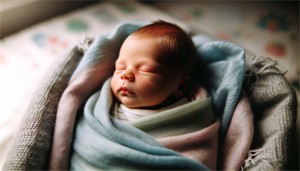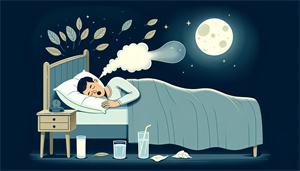Noticing that my newborn snores might prompt immediate concern, but it’s often a normal aspect of their sleep. Newborns’ small nasal passages contribute to occasional, soft snoring; it’s typically not a health concern but part of their growth process.
This article will guide you through understanding why my newborn snores, when it might signal something more serious, and practical advice to improve their sleep.
Key Takeaways
-
Newborn snoring can be attributed to small nasal passages and relaxed throat muscles during deep sleep, which isn’t typically a cause for concern unless accompanied by other symptoms.
-
Consistent, loud snoring might indicate sleep apnea, characterized by pauses in breathing, gasping, and restless sleep, which, if untreated, could lead to developmental issues.
-
Deviated septum and nasal blockages can also cause snoring in newborns and should be addressed with proper medical care to ensure normal breathing patterns.
Unraveling the Mystery Behind Newborn Snoring

When you hear your baby snoring, it’s easy to imagine them dreaming of milk and cuddles. But what’s really causing these tiny snores? The primary reasons behind newborn snoring are small nasal passages and relaxed throat muscles during deep sleep. It’s all part of their tiny anatomy and the way their bodies work while they’re catching those Zs.
Now, let’s explore the details more thoroughly. What part do their petite nasal passages and throat muscles play in this symphony of snores? And is snoring in babies a cause for concern? Indeed, if your newborn frequently snores, it might be an indication of other symptoms you need to look out for.
The Role of Nasal Passages in Newborn Snoring
Picture this: you’re trying to breathe through a straw. Difficult, isn’t it? That’s similar to how babies breathe through their tiny nasal passages. Their nostrils are so small that even a little bit of extra mucus or a minor blockage can lead to noisy breathing or even trouble breathing. As their breathing slows, it becomes more challenging for them to maintain a clear airway.
When a newborn breathes, the air has to squeeze through these tiny passages. This can sometimes cause the soft tissues in their throat to vibrate, leading to that cute but sometimes worrying snore. So, if your baby’s snoring, it might simply be because of their pint-sized nasal passages.
Deep Sleep Dynamics and Baby Snores
Just like adults, babies go through different stages of sleep. As they fall asleep, the orchestra of baby snore often begins during their deep sleep stage. This is because, in deep sleep, your baby’s throat muscles relax, leading to snoring.
However, this doesn’t imply that your baby has a sleep disorder. It’s simply a normal part of their sleep cycle. But certain factors can intensify the snoring. These include:
-
Poor pharyngeal anatomy
-
A low respiratory arousal threshold
-
High loop gain
-
Low lung volume
-
The presence of obstructive sleep apnea
Being aware of these factors will help you understand your baby’s sleep pattern better.
Identifying Sleep Apnea in Newborns

While occasional snoring is quite normal in newborns, consistent, loud snoring can sometimes be a sign of a more serious condition like sleep apnea. Sleep apnea is a sleep disorder characterized by:
-
pauses in breathing
-
gasping for air
-
choking
-
snorting
These symptoms can disrupt a newborn’s sleep.
Identifying sleep apnea in your baby involves more than just listening for snoring. Other symptoms include pauses in breathing and restless sleep. If you notice these signs, it would be advisable to consult a pediatrician.
Recognizing Symptoms Beyond Snoring
If your baby is snoring, it’s vital to watch for other symptoms. Newborns with sleep apnea experience more than just snoring. It can impact their breathing and overall health. Look out for the following symptoms:
-
Pauses in breathing
-
Restless sleep
-
Gasping, coughing, or choking
-
Mouth breathing
If you notice any of these symptoms, it’s important to consult a healthcare professional.
These symptoms can disturb their sleep and, in severe cases, lead to serious health consequences such as hypoxemia, bradycardia, and the potential necessity for resuscitation due to loss of consciousness. Moreover, if left untreated, sleep apnea can lead to developmental issues, including impaired brainstem maturation and stunted growth.
When Noisy Breathing Signals a Condition
Sometimes, noisy breathing can be a symptom of a more serious condition. A deviated septum or nasal blockages are two such conditions that could lead to snoring in babies. Both of these conditions can disrupt normal breathing patterns, leading to snoring and other respiratory issues.
While these conditions may sound scary, it’s important to remember that they are treatable. With the right medical attention and care, your little one can breathe easily and sleep peacefully.
Deviated Septum and Its Impact on Infant Snoring
A deviated septum is a condition where the nasal septum, which divides the nasal cavity into two, is not centrally aligned. This means one nostril can be larger than the other, which can lead to a variety of issues, including snoring.
It’s quite a common condition, with the reported prevalence of a deviated septum in newborns ranging from 2.9% to 31%. This condition can lead to:
-
sinus infections
-
snoring
-
noisy breathing
-
nasal congestion
If you notice that your baby is snoring and has a consistently stuffy nose, it might be due to a deviated septum.
More Than Just a Stuffy Nose: Nasal Blockages and Snoring
Nasal blockages in infants can also contribute to snoring. A stuffy nose can make it hard for your baby to breathe normally while sleeping, leading to snoring.
Nasal blockages can be caused by anything from a common cold to a more serious condition. If your baby has a stuffy nose and is snoring, it’s important to clear those blockages. This can be done using a saline solution or a nasal aspirator. Clearing their nose will help them breathe easier and reduce snoring.
The Connection Between Allergies and Baby's Snoring
Did you know that allergies can also cause your baby to snore? Certain allergens can cause inflammation in your baby’s nasal passages and throat, leading to snoring.
Allergies can also induce asthma in babies, which includes symptoms like coughing, wheezing, and difficulty breathing. If your baby has a known allergy and is snoring, it might be worth discussing with your pediatrician to see if there’s a connection.
Tips for Ensuring Quality Sleep for Your Snoring Newborn
Having examined the reasons behind your baby’s snoring, we can now discuss some strategies for promoting better sleep. After all, a well-rested baby is a happy baby!
From managing nasal congestion to ensuring the right sleeping position, there are several strategies you can employ to help your snoring newborn get the rest they need.
Clearing the Air: Managing Nasal Congestion

Clearing your baby’s nasal congestion can do wonders for reducing snoring. A simple saline solution can rinse out the nasal passages and clear out excess mucus.
However, it’s important to administer the saline drops correctly. The recommended dosage is generally 1-2 drops per nostril, once or twice a day, and suctioning should be limited to no more than two times per day.
The Right Sleeping Position for Your Snoring Baby
Adopting the correct sleeping position can significantly reduce your baby’s snoring. The safest and most recommended sleeping position for a newborn is on their back.
While it might be tempting to try different sleeping positions if your baby is snoring, it’s important to remember that safety comes first. Side sleeping is not recommended due to the increased risk of rolling onto the stomach, which can pose potential danger to the baby.
When to Seek Medical Help for Your Snoring Baby
Although most instances of baby snoring are harmless, discerning when to consult a medical professional is crucial. If your baby’s snoring is persistent, loud, and accompanied by poor weight gain or other concerning symptoms, it’s time to consult a pediatrician.
Remember, it’s always better to be safe than sorry. If you’re ever in doubt, get in touch with a medical professional. They can provide guidance and reassurance, helping you and your baby have peaceful, snore-free nights.
Monitoring Weight Gain and Other Signs
Monitoring your baby’s weight gain is an important part of assessing their overall health. Normal weight gain in newborns is around 5-7 ounces per week from 5 days to 4 months of age.
If your baby isn’t gaining weight at this rate, or if they’re showing other signs of distress like gasping or choking sounds, poor quality of sleep, or signs of struggling for breath, it may be an indication of a more serious issue related to their child’s snoring.
Adjusting Care Routines for Babies with Sleep Issues
For babies experiencing sleep issues, modifying care routines can enhance sleep quality and overall health. From optimizing sleep schedules to making modifications to the sleep environment, there are several strategies parents can implement.
Feeding times, incorporating sleep hygiene practices, and managing caregiver stress levels can all play a role in your baby’s sleep quality. Remember, newborns sleep in short bursts and need to be fed every 2-4 hours, so plan your care routines accordingly.
Summary
In conclusion, snoring in newborns, while common, can sometimes be a sign of underlying conditions like sleep apnea, a deviated septum, or nasal blockages. It’s important to monitor your baby’s snoring, looking out for other symptoms like pauses in breathing or restless sleep. However, with the right care routines, management of nasal congestion, and the correct sleeping position, your baby’s snoring can be greatly reduced, ensuring they get the quality sleep they need. Remember to always consult a pediatrician if you have any concerns about your baby’s snoring.
Frequently Asked Questions
Is it normal for a newborn to snore?
Yes, it is normal for a newborn to snore. Their petite nasal passages can cause snoring, whistling, or snuffling sounds while they sleep.
Is my baby congested or snoring?
If your baby appears healthy and does not have a fever, snoring while asleep is likely due to a congested nose, and is not a cause for concern.
Why do newborns have raspy breathing?
Newborns may have raspy breathing because their airways are smaller and softer than adults, making them more susceptible to blockage or narrowing, and causing abnormal breathing sounds and difficulty breathing. Additionally, a baby's soft and floppy larynx can temporarily block their airway when breathing, a condition known as laryngomalacia, which typically improves by the time the baby is 1 year old.
How can I reduce my baby's snoring?
To reduce your baby's snoring, try clearing nasal congestion and making sure they sleep on their back. This can make a difference in their breathing and reduce snoring.


